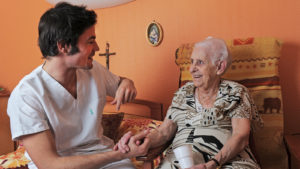 Home health is my favorite PT setting. Yet, I am keenly aware that it also means uncertainty; each home poses unique risks. If you are practicing in the home setting, being proactive is the best strategy to keep yourself safe and healthy. If you plan ahead you can focus on being the most effective PT for your patient.
Home health is my favorite PT setting. Yet, I am keenly aware that it also means uncertainty; each home poses unique risks. If you are practicing in the home setting, being proactive is the best strategy to keep yourself safe and healthy. If you plan ahead you can focus on being the most effective PT for your patient.
Cheryl Hall, OT
Author and Illustrator, Physical Therapy Toolkit
Be Prepared
- Participate in all company safety trainings and follow company procedures for reporting incidents.
- Make sure your cell phone is fully charged and keep it on your person instead of in a bag.
- Help others identify you from a distance. Wear a badge or shirt that identifies your agency and your role. Use a magnetic placard or hangtag in your car.
- Carry a personal alarm or whistle.
- Carry a flashlight for unlit areas.
- Wear good shoes that protect your feet and allow you to move quickly.
- Organize the items you need for each visit so you aren’t rummaging through your car at the last minute.
Be Safe
- Schedule visits during morning hours or request an escort from your employer.
- Trust your judgement and don’t put yourself in an environment where you are uncomfortable.
- Keep personal belongings locked in your trunk.
- Park on the street instead of a driveway where you could be blocked.
- Always be aware of where the exits are located.
- Don’t linger in your car before or after the visit.
- Be alert – stay off your cell phone as you walk to and from the house.
- Text someone prior to a potentially difficult visit, and check in when you have safely left the area.
Be Healthy
- Use pads with plastic on one side under equipment or supplies.
- Avoid placing items on carpet or upholstery.
- Use a portable hook to hang your bag from a counter or chair.
- Use personal protective equipment such as disposable gloves, coveralls or a protective apron, and goggles or a face mask.
- If the home is without water or heat, connect the patient with community resources for assistance.
- If the home is overheated in the summer, ask if you can open windows and turn on fans.
- Make sure your immunizations and TB tests are up to date.
- Be alert to improper sharps disposal.
What keeps you safe in a home health environment? Share your tips with your fellow PTs!
